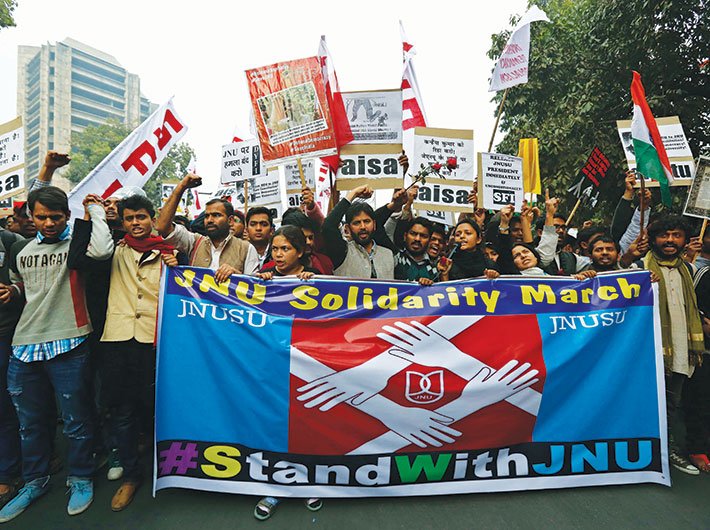The Delhi HC order in Kanhaiya’s case imposes pre-censorship on free speech by laying down vague conditions for bail.
On March 2, the Delhi high court granted bail to Jawaharlal Nehru University Students’ Union president Kanhaiya Kumar in a sedition case registered against him in connection with a function organised to protest against the hanging of parliament attack convict Afzal Guru. Though Kanhaiya is free now, his personal liberty and freedom of thought may be hostage to the vague conditions for bail spelt out in the order by justice Pratibha Rani.
While the bail is subject to Kanhaiya preventing “anti-national activities in the campus” and not participating in activities which “may be termed as anti-national”, neither the constitution nor any statute refers to, defines or lists acts which could be considered anti-national.
The order by justice Rani attempts to characterise nationalism and categorise (mere) sloganeering etc., as anti-national activity but there seems to be no legal basis for the conclusions drawn or the observations made by the judge in this regard. In fact, the observations in the order seem to have drawn a lot from political jibes and public debates following the arrest of Kanhaiya.
The need for certainty in criminal law demands interpretation of Section 124A of the Indian Penal Code (sedition) taking into account the literal meaning of the words used or as interpreted in precedents, but the March 2 order gives a clear impression that the judge has tried to look at the provision through the prism of nationalism. The order unnecessarily refers to sacrifices and hardships faced by personnel in the defence forces while discussing the scope and extent of freedom of speech and expression.
Justice Rani introduces ‘nationalism’ at the outset by quoting a patriotic song from a Bollywood film of yesteryears. The order begins with a prologue in the form of a passage from “Mere Desh ki Dharti sona ugle” song from the film Upkaar.
Though the court allowed interim bail, the order virtually condemns teachers without hearing them, makes Kanhaiya vicariously liable for acts of other students, criminalises thought and unnecessarily makes references to defence forces while considering the scope of constitutionally guaranteed rights.
Justice Pratibha Rani made release of Kanhaiya subject to an affidavit by him undertaking to “make all efforts within his power to control anti-national activities in the campus” and not to “participate actively or passively in any activity which may be termed as anti-national”. An application for cancellation of bail can, thus, be moved in case of any “anti-national” activity in the JNU campus or for any act by Kanhaiya which “may be” termed anti-national.
With there being scope for two opinions on acts which can be termed anti-national, the conditions for bail may not be clear enough for Kanhaiya to comply with. An act which may be anti-national for one may not be the same for another. The conditions for bail virtually put pre-censorship on free speech and expression and restrict the freedom of expression for which Kanhaiya had approached the high court.
In fact, Kanhaiya was arrested for an act which he considers to be lawful. “That the petitioner has committed no offence whatsoever… As a responsible students’ union president, the petitioner has never sought to subvert the law. The petitioner is a proud citizen of India and has always affirmed his faith in the Constitution of India. The petitioner now seeks the protection of his life, liberty and rights as guaranteed under the Constitution of India. The utterances (speech or slogans) attributable to the petitioner, is not in violation of any law, or the Constitution of India, and as such the petitioner has committed no offence,” Kanhaiya submitted in his writ petition before the high court.
While Kanhaiya sought the court’s intervention against violation of his fundamental right to speech and expression, justice Rani did not focus on the legal issue and made references to the challenges faced by army men while defending the borders. The court responded to Kanhaiya’s claim over right to speech and expression guaranteed to citizens under Article 19(1)(a) by pointing to corresponding fundamental duties enshrined under Article 51A of the constitution. Instead of delineating the extent and scope of the right in the backdrop of reasonable restrictions permitted under Article 19(2), the court strayed outside the realm of law by seemingly borrowing arguments from the debates taking place outside the court.
“Suffice it to note that such persons enjoy the freedom to raise such slogans in the comfort of university campus but without realising that they are in this safe environment because our forces are there at the battlefield situated at the highest altitude of the world where even the oxygen is so scarce that those who are shouting anti-national slogans holding posters of Afzal Guru and Maqbool Bhatt close to their chest honoring their martyrdom may not be even able to withstand those conditions for an hour even,” justice Rani said.
“While dealing with the bail application of the petitioner, it has to be kept in mind by all concerned that they are enjoying this freedom only because our borders are guarded by our armed and paramilitary forces,” she added.
Such an argument may be forceful enough to win debates or put panelists on a TV show on the back-foot but is no answer to violation of the fundamental right to speech and expression. Though there is a clear disconnect between the two issues, reference to sacrifice by the defence forces may have cropped up during debates in the media on account of the death of some soldiers in Siachen around the same time.
The court termed such protests as infections and suggested “amputation” as treatment if such infections led to “gangrene”.
It did not stop at students. “The faculty of JNU also has to play its role in guiding them to the right path,” it said.
While the court went beyond the scope of the petition by reminding teachers of their duty, it also went on to criminalise the thinking process. The “thoughts” reflected in the slogans cannot be claimed to be protected as freedom of speech and expression, the court said.
The observations, including the bail condition which virtually bars even passive involvement in any similar protest, may not be in sync with the basic principles of jurisprudence and judicial thinking which is against penalising one for mere sympathising with any banned group. In the Arup Bhuvan case, the supreme court in 2011 went a step further by holding that “mere membership of a banned organisation (without any active role) will not make a person a criminal”.
The Delhi high court, while considering a petition by a Greenpeace activist earlier, stressed that the freedom of expression included the right to express dissent. “Criticism, by an individual, may not be palatable; even so, it cannot be muzzled… The state may not accept the views of the civil right activists, but that by itself, cannot be a good enough reason to do away with dissent,” the court had observed.
Though the court granted interim bail to Kanhaiya in the case, the conditions imposed may not be reasonable as courts in the past have ensured that even the walls of jails did not restrict the freedom of speech and expression. In the famous Auto Shankar case, the supreme court allowed publication of the autobiography of a prisoner on death row. Earlier in the Prabha Dutt case, the court in 1981 allowed media to interview death-row convicts Ranga and Billa in Tihar jail.
The problem with the March 2 order is that the court while deciding on bail to Kanhaiya seems to have decided to set everything right.
Singh is a Delhi-based lawyer.
The article appears in the March 16-31, 2016 issue.



